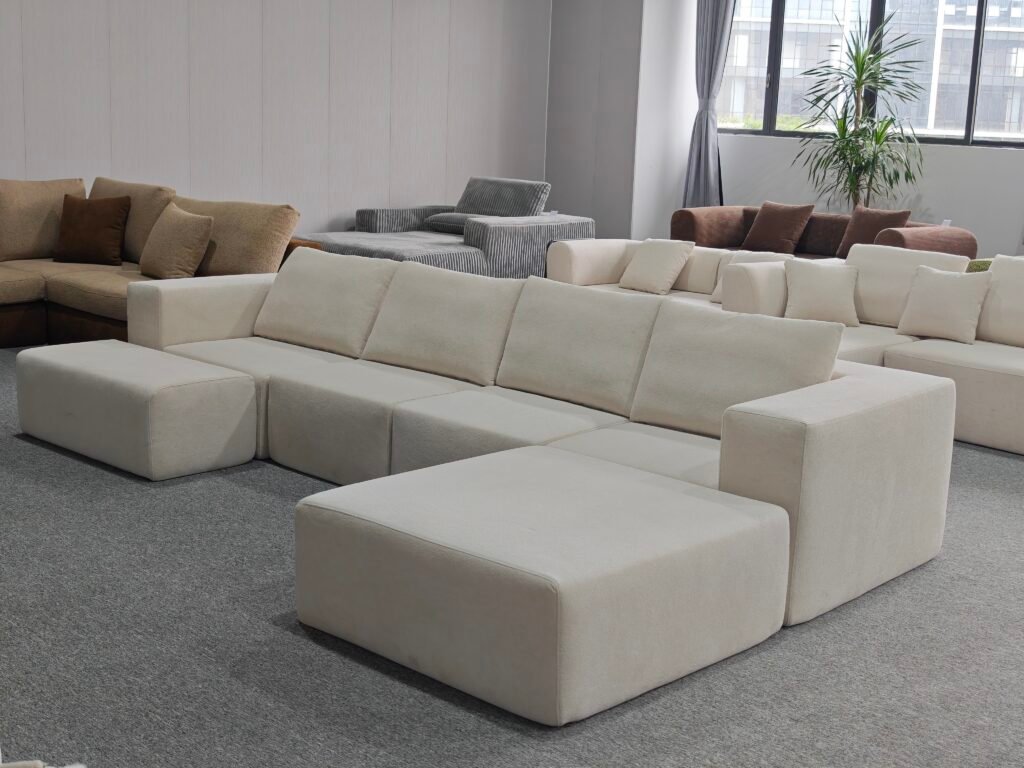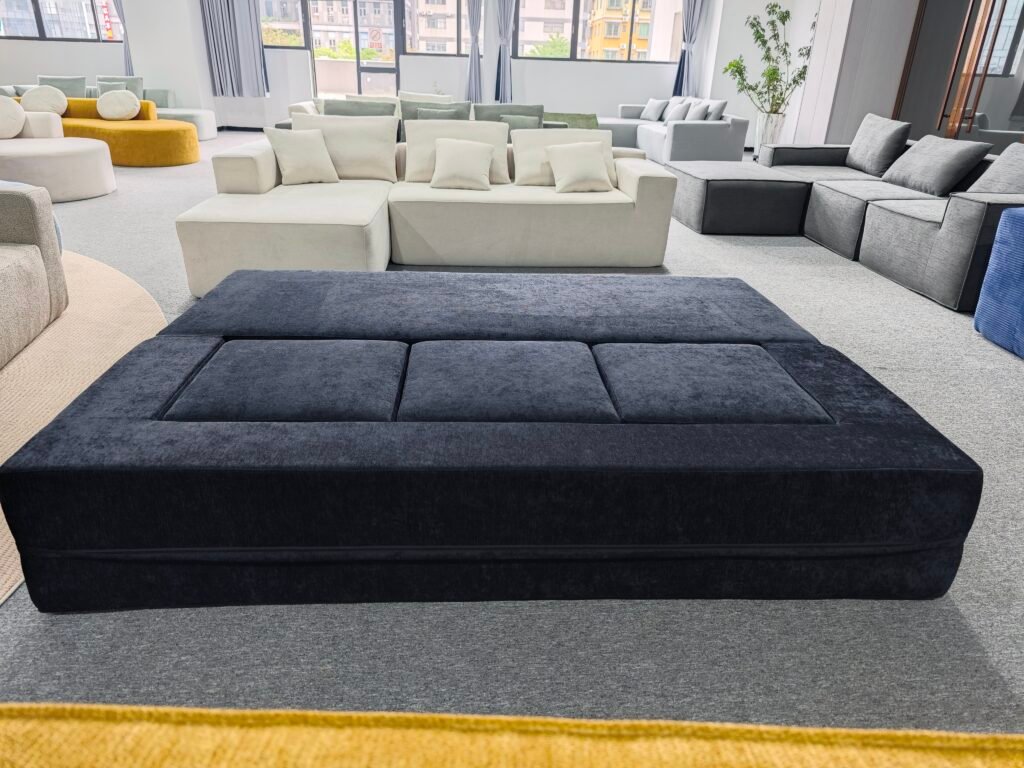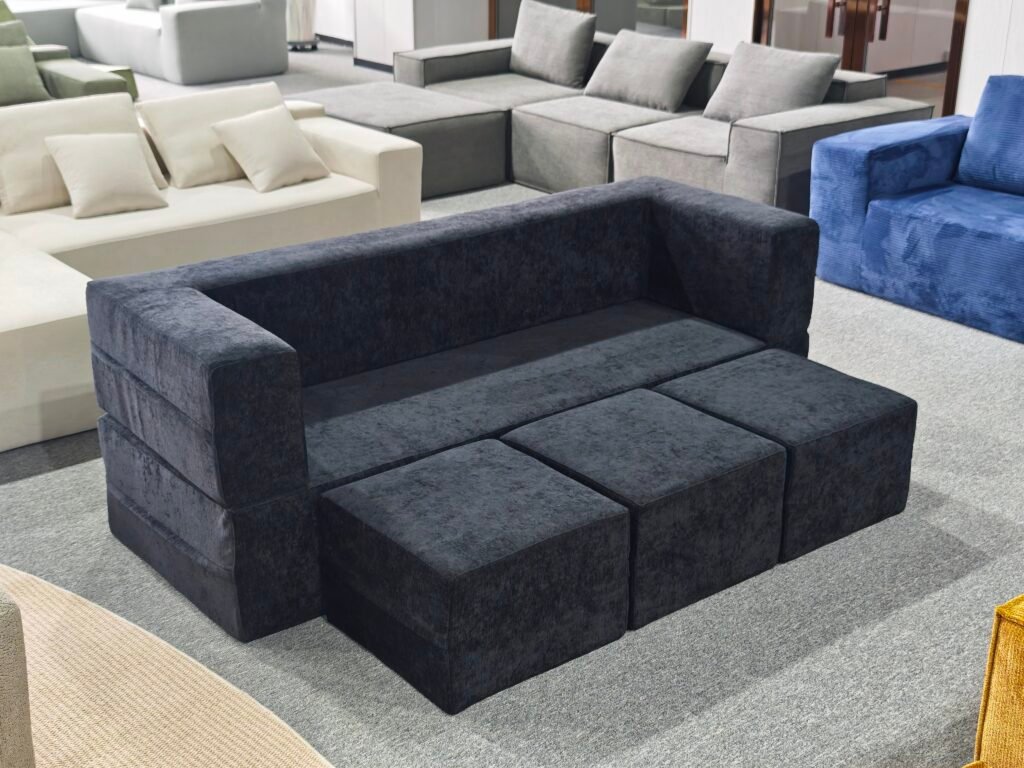In today's furniture industry, sustainability has become a pivotal factor shaping manufacturing and supply chain decisions. The rise of compressed sofas as a modern furniture innovation not only revolutionizes shipping and storage but also presents unique opportunities and challenges in sustainable production and exporting. At Modular Sofas, we are committed to integrating environmentally responsible practices throughout the lifecycle of our compressed sofas—from raw material sourcing to end-user delivery—ensuring that our products meet the highest standards of quality and sustainability.
This article explores how sustainability is navigated in the production and exporting of compressed sofas, highlighting eco-friendly materials, energy-efficient manufacturing, sustainable packaging, carbon footprint reduction in logistics, and industry-wide challenges and future trends.


Understanding Sustainability in Compressed Sofa Production
Compressed sofas are designed to be compacted for efficient shipping, which inherently reduces transportation emissions and packaging waste. However, sustainability in production involves more than just logistics efficiency. It encompasses the entire supply chain, including raw materials, manufacturing processes, labor practices, and waste management.
Sustainable production focuses on minimizing environmental impact while maintaining product durability and customer satisfaction. For compressed sofas, this means selecting materials that are renewable or recyclable, reducing energy consumption during manufacturing, and ensuring that waste is minimized or repurposed.
Eco-Friendly Raw Materials
The choice of materials significantly influences the environmental footprint of compressed sofas. Traditional sofas often use polyurethane foam, synthetic fabrics, and hardwood frames sourced from non-sustainable forestry. To enhance sustainability, many manufacturers, including Modular Sofas, are shifting towards:
- Certified Sustainable Wood: Using FSC (Forest Stewardship Council) or PEFC (Programme for the Endorsement of Forest Certification) certified wood ensures responsible forestry practices that protect ecosystems and biodiversity.
- Recycled or Bio-Based Foams: Innovations in foam technology have introduced bio-based foams derived from plant oils and recycled foam materials that reduce reliance on petrochemicals.
- Natural Fibers and Low-Impact Fabrics: Organic cotton, hemp, linen, and recycled polyester fabrics reduce chemical use and water consumption compared to conventional textiles.
- Non-Toxic Adhesives and Finishes: Using water-based glues and low-VOC (Volatile Organic Compound) finishes improves indoor air quality and reduces harmful emissions.
Energy Efficiency in Manufacturing
Manufacturing compressed sofas involves cutting, assembling, compressing, and packaging, all of which consume energy. Sustainable production aims to reduce energy use and switch to renewable sources where possible.
- Optimized Production Lines: Implementing lean manufacturing principles minimizes waste and energy consumption by streamlining processes and reducing idle times.
- Renewable Energy Integration: Solar panels, wind turbines, or purchasing green energy credits can offset factory energy use.
- Efficient Machinery: Upgrading to energy-efficient cutting machines, compressors, and conveyors reduces electricity demand.
- Waste Heat Recovery: Capturing and reusing heat generated by machinery can lower heating costs and emissions.
Waste Reduction and Recycling
Waste management is a critical sustainability component. Foam offcuts, fabric scraps, and packaging materials can contribute significantly to landfill waste if not handled responsibly.
- Material Optimization: Designing patterns and cutting layouts to maximize material use reduces scrap.
- Recycling Programs: Collecting foam scraps for reprocessing or converting into carpet underlay, insulation, or packaging materials.
- Compostable or Recyclable Packaging: Using biodegradable films or recyclable cardboard reduces plastic pollution.
- Circular Economy Initiatives: Encouraging take-back programs or refurbishing old sofas extends product life and reduces waste.
Sustainable Exporting of Compressed Sofas
Exporting compressed sofas efficiently is one of the most significant sustainability advantages compared to traditional bulky furniture. However, exporting also involves environmental considerations beyond just volume reduction.
Reduced Carbon Footprint Through Compression
By compressing sofas, shipping companies can load significantly more units per container, reducing the number of shipments needed and thus lowering greenhouse gas emissions per unit.
- Increased Container Utilization: A 40HQ container can hold up to 3-6 times more compressed sofas than traditional sofas, drastically improving shipping efficiency.
- Lower Fuel Consumption per Unit: Fewer containers and trips mean less fuel burned, directly reducing carbon emissions.
- Facilitated Intermodal Transport: Compressed sofas are easier to transfer between ships, trucks, and trains, enabling more efficient multimodal logistics.


Sustainable Packaging for Export
Packaging plays a crucial role in protecting compressed sofas during transit but also contributes to environmental impact. Sustainable exporting requires balancing protection with eco-friendly materials.
- Minimalist Packaging Design: Using only necessary packaging layers reduces waste.
- Recyclable and Biodegradable Materials: Kraft paper, cardboard, and compostable films replace conventional plastics.
- Reusable Packaging Solutions: Pallets and crates designed for multiple uses lower resource consumption.
- Labeling and Instructions for Recycling: Clear guidance helps customers dispose of packaging responsibly.
Compliance with Environmental Regulations
Exporters must navigate various international environmental regulations that govern packaging, emissions, and waste disposal.
- Adherence to International Standards: Compliance with ISO 14001 (Environmental Management) and other certifications demonstrates commitment to sustainability.
- Customs and Import Restrictions: Understanding country-specific bans on certain materials or packaging types avoids shipment delays and penalties.
- Carbon Reporting and Offsetting: Some clients require carbon footprint disclosures and may incentivize carbon offset purchases.
Challenges in Sustainable Compressed Sofa Production and Exporting
Despite advances, several challenges remain in fully realizing sustainability in compressed sofa production and export.
- Material Innovation Limitations: Bio-based foams and natural fabrics can be costlier or have performance trade-offs compared to conventional materials.
- Energy Source Constraints: Factories in regions with limited renewable energy infrastructure face difficulties reducing carbon footprints.
- Supply Chain Complexity: Ensuring sustainability across multiple suppliers and subcontractors requires rigorous auditing and transparency.
- Consumer Awareness and Demand: While growing, demand for sustainable furniture is not yet universal, affecting economies of scale.
- Recycling Infrastructure: End-of-life foam recycling remains limited in many markets, posing disposal challenges.
Future Trends in Sustainable Compressed Sofa Industry
The compressed sofa industry is evolving rapidly, with several promising trends driving sustainability forward.
- Advanced Bio-Based and Recyclable Materials: Research into fully recyclable foams and fabrics aims to close the loop on product life cycles.
- Digital Manufacturing and AI Optimization: Smart factories use AI to optimize cutting patterns, reduce waste, and improve energy efficiency.
- Carbon-Neutral Shipping: Partnerships with shipping companies using biofuels or electric vehicles reduce logistics emissions.
- Circular Business Models: Leasing, refurbishment, and resale platforms extend sofa lifespans and reduce consumption.
- Consumer Education: Transparent labeling and storytelling about sustainability efforts build trust and encourage responsible purchasing.
Sustainability Comparison Table: Traditional vs. Compressed Sofa Production and Exporting
| Aspect | Traditional Sofa Production & Exporting | Compressed Sofa Production & Exporting |
|---|---|---|
| Raw Materials | Conventional polyurethane foam, synthetic fabrics, non-certified wood | Bio-based/recycled foams, organic/recycled fabrics, FSC-certified wood |
| Energy Consumption | Higher due to bulkier manufacturing and packaging | Lower due to leaner processes and efficient compression technology |
| Packaging Materials | Bulky, multi-layer plastic and cardboard | Minimalist, recyclable, biodegradable packaging |
| Container Utilization | Low (30-50 sofas per 40HQ container) | High (180-300+ sofas per 40HQ container) |
| Carbon Emissions per Unit | Higher due to inefficient shipping and larger volume | Significantly reduced due to volume compression and optimized logistics |
| Waste Generation | More foam scraps, fabric waste, and packaging landfill | Reduced waste via optimized cutting and recyclable packaging |
| End-of-Life Recycling | Limited infrastructure, often landfill disposal | Emerging programs for foam recycling and sofa refurbishment |
| Compliance and Certification | Variable, often lacking comprehensive environmental standards | Increasing adherence to ISO 14001, FSC, and other eco-certifications |
| Consumer Perception | Traditional, less focus on sustainability | Growing demand for eco-friendly, space-saving furniture |
Modular Sofas’ Commitment to Sustainability
At Modular Sofas, sustainability is embedded in every stage of our compressed sofa lifecycle. We prioritize:
- Partnering with certified sustainable material suppliers
- Investing in energy-efficient manufacturing equipment
- Designing sofas for easy compression without compromising durability
- Developing eco-friendly packaging solutions
- Collaborating with logistics partners to reduce carbon footprint
- Educating customers on care, recycling, and responsible disposal
Our mission is to offer stylish, comfortable, and modular sofas that not only enhance living spaces but also protect the planet.


Conclusion
Navigating sustainability in compressed sofa production and exporting requires a holistic approach that integrates material innovation, energy efficiency, waste reduction, and smart logistics. Compressed sofas inherently contribute to greener shipping by maximizing container utilization and minimizing packaging waste, but true sustainability extends throughout the supply chain.
As environmental awareness grows globally, furniture manufacturers and exporters must embrace sustainable practices to meet regulatory demands and consumer expectations. Modular Sofas stands at the forefront of this movement, delivering high-quality compressed sofas that align with ecological responsibility.
By choosing compressed sofas from sustainable producers, businesses and consumers alike can enjoy the benefits of modern furniture innovation while supporting a healthier planet.